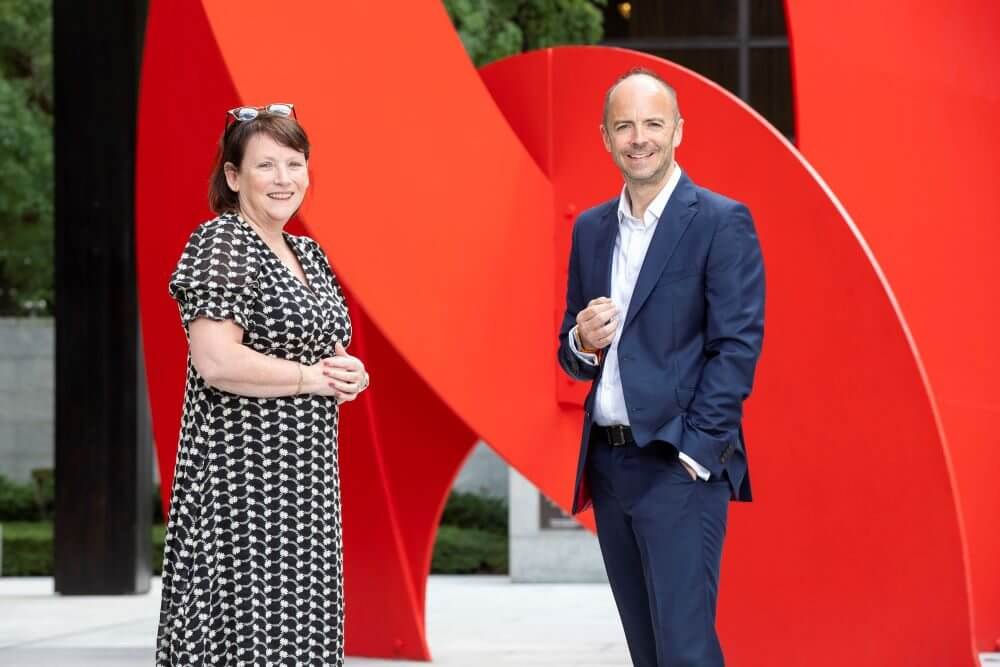Podcast Ep 275: Sinead Quinn says IP Telecom’s gender-balanced workforce stands out in an industry that is traditionally dominated by male leadership.
When Sinead Quinn began her telecommunications career in 2000, the industry landscape looked markedly different. Sales teams were predominantly male, customers switched providers annually chasing the lowest rates, and technology remained fragmented across fixed lines, mobile networks, and separate broadband services.
Today, as channel manager at Dublin-based IP Telecom, Quinn oversees a business that exemplifies the transformation sweeping Irish telecommunications. The company, founded in 2010 by Shena Brien and Brian Chamberlain, maintains a 50-50 gender split across its 50-person workforce and has built its growth strategy around long-term customer relationships rather than transactional pricing competition.
“I do think give it another number of years, you will see throughout the different levels within companies more female leaders and more females in sales”
The company’s vendor-neutral dedicated B2B network offers customers fully integrated solutions to power today’s modern way of working. The company has developed its own cloud-based telephone system to provide its customers with excellent call quality, customer service and technical consultancy.
“Broadband has come a long, long way, and we can certainly say that it’s improved since the National Broadband Plan became involved getting what we would call the hard to reach parts of the country connected,” Quinn explains. “Thankfully, the days of a huge tech industry not having the right connectivity are in the rear view mirror.”
The connectivity improvements reflect Ireland’s broader digital infrastructure development. While 5G coverage reaches 90% nationally and 4G achieves 99% penetration, Quinn notes that optimisation remains crucial. “For a lot of businesses, connectivity is at the forefront. It’s their first conversation: What is the connectivity? What will it be? What do I need? And what is the best product that can serve their business?”
Female leadership gains prominence
IP Telecom’s gender-balanced workforce stands out in an industry traditionally dominated by male leadership. Quinn, who managed teams at Eir and Vodafone before joining IP Telecom, has witnessed significant changes in sector demographics.
“I’ve been in telecoms since probably 2000, so I would have seen that back then it was very male-dominated,” she reflects. “It still can be across certain areas, particularly the sales side of the business. Within telecoms, a lot of the teams across the country would be male predominantly.”
However, recent appointments suggest broader transformation. “Even if you look at the wider telecoms market, you have the heads of the likes of Vodafone being female, and more recently, Three announced Elaine Carey as CEO. So it is great to see female-led businesses within the telecom sector.”
Quinn believes the industry will continue evolving toward greater gender balance. “I do think give it another number of years, you will see throughout the different levels within companies more female leaders and more females in sales.”
Cloud consolidation drives growth
IP Telecom’s business model capitalises on the technology convergence that has eliminated traditional boundaries between telecommunications services. The company operates through two channels: direct sales to customers and a partner network that includes IT sector firms and managed service providers.
“Our business is split into direct selling to customers and then we have the partner channel,” Quinn says. The partner approach has proven particularly successful as businesses seek consolidated service delivery. “There are SME businesses out there that want a one-stop shop where they can get all the products delivered from one provider, as opposed to going to three or four different providers with four or five different bills.”
The company’s Dublin-based data centers support a robust platform serving businesses from small enterprises to large multinational companies. This infrastructure enables IP Telecom to maintain control over service delivery while offering partners access to comprehensive telecommunications solutions through an easy-to-use portal.
“We train our partners on sales because telecoms is not their core business,” Quinn explains. “We have training teams within IP Telecom that work with them on an ongoing basis, whether they get tenders in or new customers, so they can grow their business and grow what they’re offering customers.”
Consultative selling replaces price competition
The shift toward consultative selling represents a fundamental change in how telecommunications services are marketed and sold. Quinn attributes this evolution to businesses becoming more sophisticated in their technology requirements and less willing to engage in annual provider switching.
“Years ago, it was all about the rate – what do I pay for a mobile call? What do I pay for a landline call?” she observes. “Whereas now, IP Telecom brought out a product called IPT Essentials – it’s an all-inclusive package dependent upon how many employees or users are within the business. That’s a guaranteed rate that they will pay each month.”
This approach aligns with broader market trends favoring recurring revenue models and customer retention strategies. IP Telecom maintains dedicated teams focused on existing customers, identifying upselling opportunities and introducing new products that enhance business operations.
“Customers very much want to know what their bill is. They don’t want it going up and down,” Quinn says. “We have a package tailored for that, which is what customers want and keeps them happy.”
Security concerns shape AI adoption
While artificial intelligence integration accelerates across telecommunications globally, Irish businesses maintain cautious approaches to implementation. Quinn notes that many of IP Telecom’s partners specialise in security software, reflecting customer priorities around data protection.
“There are the big global players out there that have been using AI for several years now with chatbots, virtual assistants, and handling basic queries,” she acknowledges. “But I suppose there is still skepticism about what that involves – the security side of it, the GDPR side of it as well for a lot of companies.”
IP Telecom monitors developments from larger providers like RingCentral and 8×8, which have integrated AI into call analytics platforms. However, the company prioritises data security, reliability and trust before engaging customers in AI-related conversations.
“It’s certainly something we wouldn’t rush into, but we really need to keep the conversation going with our customers about what they would want, what their expectations are,” Quinn says. “It’s an exciting time though, because you have a lot of customers that want to do certain things within their business that they may not have been able to do before.”
International expansion potential
IP Telecom’s cloud-based architecture positions the company for potential international growth beyond its current Irish focus and South African partner presence. The technology platform’s flexibility allows partners to serve customers regardless of geographic location.
“We have a lot of partners that I work with who have customers that could be Irish, could be in the UK, so they work anywhere and can deal with any business,” Quinn concludes.
While international expansion remains under consideration, the company maintains its primary focus on growing its Irish customer base. “Predominantly, at the moment, our focus is growing the Irish base, but we are always open to exploring new markets. We always keep an eye on those trends.”
-
Bank of Ireland is welcoming new customers every day – funding investments, working capital and expansions across multiple sectors. To learn more, click here
-
For support in challenging times, click here
-
Listen to the ThinkBusiness Podcast for business insights and inspiration. All episodes are here. You can also listen to the Podcast on:
-
Spotify
-
SoundCloud
-
Apple




